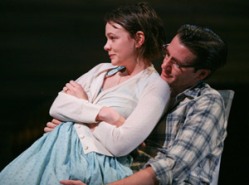Review: Through a Glass Darkly

Through a Glass Darkly, the theatrical adaptation of Ingmar Bergman’s 1961 film being presented by the Atlantic Theater Company, demonstrates how much his work depended on the brilliant use of imagery. This claustrophobic portrait of a young woman succumbing to mental illness feels dramatically wan on stage, despite an artfully atmospheric production by David Leveaux and excellent work by the fine four-person ensemble, including rising star Carey Mulligan (An Education, Broadway’s The Seagull) in the lead role.
Set in 1960 on a remote island (Bergman’s home of Faro in the film), the work-- adapted for the stage by Jenny Worton and previously seen at London’s Almeida Theatre—concerns a family vacation undertaken by twentysomething Karin (Mulligan); her solicitous, doctor husband Martin (Jason Butler Harner); her 16-year-old brother Max (Ben Rosenfield); and her self-absorbed, novelist father David (Chris Sarandon).
Despite Karin’s optimistic comment that “everything will be perfect this holiday,” it quickly becomes apparent that this will not be the case. Karin is clearly suffering from some sort of schizophrenia, a disease to which her mother succumbed. Gripped in the throes of religious hysteria, she comes to believe that she has a direct conduit to God.
Her husband attempts to treat her with regular doses of sedatives to little avail, while her father observes what’s happening with a clinical detachment, as if researching juicy material for an upcoming novel. And the brother, coping with his own adolescent angst, becomes even more sexually confused when Karin’s behavior towards him turns less than sisterly.
Unfortunately, what comes across so powerfully on film, especially with its haunting black and white cinematography, seems stilted onstage. Dialogue was never particularly Bergman’s strong suit, and Worten’s adaptation is little improvement.
Still, its themes come across effectively, especially with Bergman’s almost certainly autobiographical depiction of the father as an artist more concerned with his work than with the problems of the flesh-and-blood creatures surrounding him.
Takeshi Kata’s monochromatic grey set design provides a suitable starkness, and Karin’s increasing descent into madness is well conveyed by David Van Tieghem’s eerie music and sound effects.
Mulligan beautifully conveys her character’s emotional fragility, bearing both body and soul in her heart-wrenching performance. She’s well supported by her male co-stars, especially young Rosenfield in an impressive Off-Broadway debut.
Although a devoted theater practitioner, Bergman was famously reluctant to allow his films to receive stage adaptations. This only sporadically effective version of one of his greatest works demonstrates the creative pitfalls involved.
New York Theatre Workshop, 79 E. 4th St. 212-279-4200. www.ticketcentral.com.
| Print article | This entry was posted by Frank on 06/07/11 at 04:29:11 am . Follow any responses to this post through RSS 2.0. |